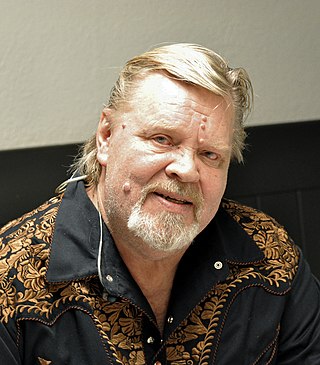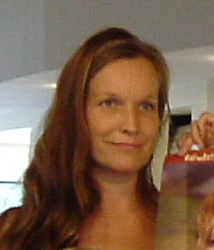
Vesa-Matti "Vesku" Loiri was a Finnish actor, musician and comedian, best known for his role as Uuno Turhapuro, whom he portrayed in a total of 20 movies between the years 1973 and 2004.

The Jussi Awards are Finland's premier film industry prizes, awarded annually to recognize the achievements of directors, actors, and writers.

Sääksmäki is a village and a former municipality, currently part of Valkeakoski in the Pirkanmaa region of Western Finland. A past president of Finland, Pehr Evind Svinhufvud, the Finnish film producer and director Veikko Aaltonen, eminent Finnish historian Eino Jutikkala, and actress Pirkko Mannola, were born there.

Daddy and the Muscle Academy is a 1991 Finnish documentary film directed and written by Ilppo Pohjola. The documentary is focused on the life and works of Tom of Finland, the pseudonym of Finnish gay erotic artist Touko Laaksonen.

Pirjo Irene Honkasalo is a Finnish film director who has also worked as a cinematographer, film editor, producer, screenwriter and actress. In 1980 she co-directed Flame Top with Pekka Lehto, with whom she worked earlier and later as well. The film was chosen for the 1981 Cannes Film Festival. In the 1990s she focused on feature documentaries such as "The Trilogy of the Sacred and the Satanic". Honkasalo returned to fiction with Fire-Eater (1998) and Concrete Night (2013), both of which were written by Pirkko Saisio. Concrete Night won six Jussi Awards in 2014, among them the Jussi for the Best Direction and the Jussi for the Best Film. Its world premiere was at the Toronto International Film Festival in Masters series.

Johanna Vuoksenmaa is a Finnish television and film director and screenwriter who has also worked as a photographer, installation artist and a teacher. Her films have been shown at numerous film festivals around the world and she has won many Finnish film and television awards for directing and screenwriting. As a director and screenwriter, Vuoksenmaa prefers the comedy genre because to her comedy means relief, forgiveness and defense. She does not use casting agencies but prefers to cast actors to her films herself, since she thinks that it creates a level of trust between the actor and the director.
The Classic is a 2001 Finnish comedy film directed by Kari Väänänen. It is based on Kari Hotakainen's semi-autobiographical novel Klassikko. The film stars Martti Suosalo as writer Kari Hotakainen who receives an assignment from his publisher to write a confessional autobiographical novel.
Jukka Immonen is a Finnish musician, record producer and composer.
Antti Eerikki Peippo was a Finnish cinematographer, director, set designer, screenwriter and actor. He was the cinematographer in all but one of director Risto Jarva's films. After Jarva died in 1977, Peippo continued to work in other productions of Jarva's production company Filminor.
Ilkka Untamo Järvi-Laturi was Finnish-born US-based film director whose best known film was Spy Games (1999) starring Bill Pullman and Irene Jacob. The film was shot in Helsinki, New York and Toronto. Järvi-Laturi had a cameo role in the film.
Eero "Käkä" Milonoff is a Finnish actor. He graduated from the Helsinki Theatre Academy in 2005, and he works as a freelance actor. In 2008, he was nominated for the Jussi Award for Best Actor for his role in the biopic Ganes (2007) as the drummer and vocalist Remu Aaltonen of the rock band Hurriganes.

Saatanan Radikaalit is a 1971 Finnish comedy film starring and directed by Paavo Piironen, Heikki Nousiainen, Heikki Huopainen and Timo Nissi. It was financed and produced by Finnish film-maker Spede Pasanen, but unlike the comedy films he had produced previously he did not feature him on-screen. The movie was released in 1971, the same year as Spede's Hirttämättömät and Kahdeksas Veljes. The film was intended to give its four stars a start in the Finnish film industry as both directors and leading actors.

The 1st Jussi Awards ceremony, presented by Elokuvajournalistit ry, honored the best Finnish films released between October 1, 1942 and September 30, 1944 and took place on November 16, 1944 at Restaurant Adlon in Helsinki. The Jussi Awards were presented in seven different categories, including Best Director, Best Cinematography, Best Production Design, Best Actor, Best Actress, Best Supporting Actor, and Best Supporting Actress.
The 2nd Jussi Awards ceremony, presented by Elokuvajournalistit ry, honored the best Finnish films released between October 1, 1944 and September 30, 1945 and took place on November 16, 1945 at Restaurant Adlon in Helsinki. The Jussi Awards were presented in seven different categories, including Best Director, Best Cinematography, Best Production Design, Best Actor, Best Actress, Best Supporting Actor, and Best Supporting Actress.
The 3rd Jussi Awards ceremony, presented by Elokuvajournalistit ry, honored the best Finnish films released between October 1, 1945 and July 31, 1946 and took place on November 1, 1946 at Restaurant Fennia in Helsinki. The Jussi Awards were presented in seven different categories, including Best Cinematography, Best Production Design, Best Actor, Best Actress, Best Supporting Actor, Best Supporting Actress, and Best Short Film. Additionally, a Special Jussi Award was given out for a young actor, and three Honorable Mentions were included at the ceremony.
The 4th Jussi Awards ceremony, presented by Elokuvajournalistit ry, honored the best Finnish films released between August 1, 1946 and July 31, 1947 and took place on October 19, 1947 at Restaurant Fennia in Helsinki. The Jussi Awards were presented in seven different categories, including Best Director, Best Cinematography, Best Short Film, Best Actor, Best Actress, Best Supporting Actor, and Best Supporting Actress.

Jussi Award for Best Actor is an award presented annually at the Jussi Awards, the premier film industry event in Finland. The 1st Jussi Awards ceremony was held in 1944, with Joel Rinne winning the first Jussi Award for Best Actor for his performance in Kirkastettu sydän.

Sleeping Beauty is a Finnish family fantasy film made in 1949, directed by Edvin Laine and produced by T. J. Särkkä. The title part of the film is played by Tuula Usva, the king is played by the director's brother Aarne Laine and the queen is played by the director's wife Mirjam Novero. The film is based on Sleeping Beauty by the Brothers Grimm and also the play written by Zachris Topelius based on the Grimm's fairy tale.








